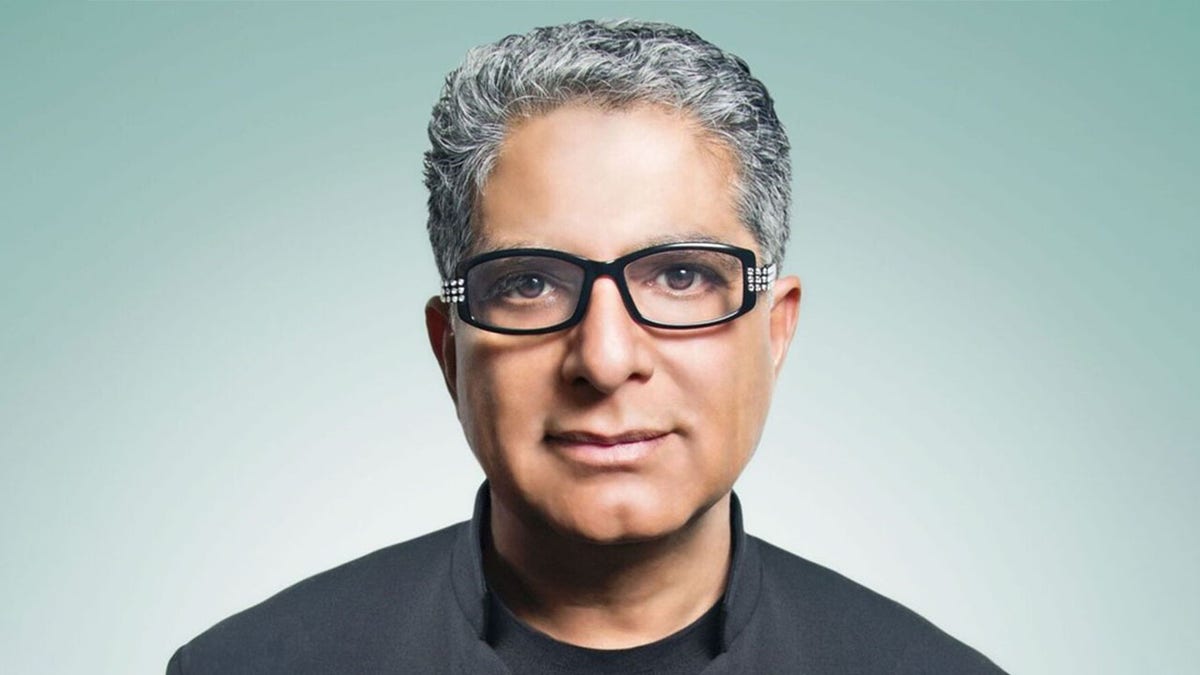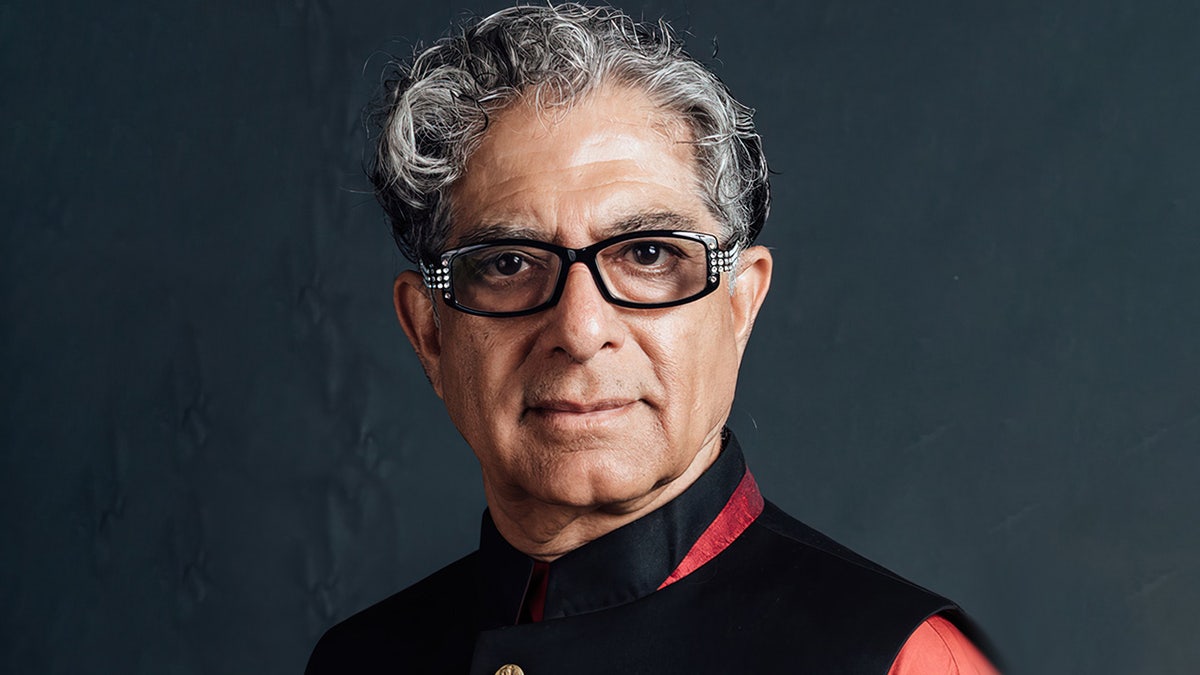Dr. Deepak Chopra explains how to deal with anxiety amid COVID-19 crisis
Dr. Deepak Chopra on the need for spiritual well-being during the coronavirus pandemic.
For those who feel frantic, worried, and stressed in this time of COVID-19, high inflation, high crime, bare grocery shelves, cultural divisiveness, and much more, holistic health expert and author Deepak Chopra has some calming advice and insights.
Speaking to Fox News Digital in the early weeks of the New Year of 2022, Chopra emphasized that all must be put in context. We have more control over our attitudes than we think, he urged, no matter what is swirling around us.
"When we have situations such as the pandemic, or a financial crisis, or when somebody loses a loved one, or loses a job, or someone is diagnosed with cancer — these things can happen to people at almost any time," he told Fox News Digital during the interview.
HOW TO REVERSE YOUR BIOLOGICAL AGE AND FEEL YOUNGER
"And they have. We are not the first generation" to undergo hard times and struggles of all types, he noted.
Chopra, 75, reminded others that in America, "We had the Second World War. We had the atomic bomb. And of course, we had the Holocaust, the Great Depression, before that the First World War, and so much more."
"You keep going back, and this is humanity, for every generation," he said. "So in terms of the difficulties we may be undergoing right now, we are not unique."

In the month of January 2022, Deepak Chopra talked to Fox News Digital about ways everyone can stay healthy, centered, and focused on joy, even in the toughest of times. "Ask yourself: Am I doing what is joyful?" he said. It's more important to ask this than people think — and he explained why. (Jeremiah Sullivan)
With that in mind, instead of allowing turmoil around us to become overwhelming, he said, "We should at this moment question what life is about — and remind ourselves of the answer. Life is about experiencing joy."
Easier said than done, when there is great challenge and tragedy occurring in our own lives or very close to us, of course. And many readers know and understand — and value — the power of prayer and of reaching out to God, both in good times and in bad.
Yet Chopra's message remains the same: "If joy is not the measure of your success, then you are wasting your life. Ask yourself: Am I doing what is joyful?"
GEORGIA QUARTERBACK STETSON BENNETT'S WORDS TO LIVE BY: ‘LIFE IS TOUGH, WORK THROUGH IT’
Social scientists have studied happiness and joy for many years, Chopra commented — and key takeaways exist from that extensive body of research.
"Do you realize," he said, "that 50% of the experience of happiness or unhappiness that we feel in our lives comes from our own attitudes? So, is what is happening an opportunity, or is it a problem?" he said.
In a nutshell, his advice is this: We cannot look to outside forces to be the sole source of our happiness or even a major source. We must, even in the toughest of times, strive to discover it within ourselves — and find and identify the happiness no matter what may be going on.
"We can start to create a pandemic of joy. And we need that. We need a pandemic of joy right now."
"Even during the pandemic, think of it: There are people who created great new businesses," said Chopra, or those who grew their businesses enormously.
"Look at Zoom, for example," he said. "Look at the new vaccinations that have come out. Look at the new technologies that have come out. And there is much more to come — there may even be personalized vaccines," he said, not just for COVID-19, but for other diseases as well, including cancer.
In the right frame of mind, he said, "we can start to create a pandemic of joy. And we need that. We need a pandemic of joy right now."

Deepak Chopra said during an interview with Fox News Digital in January 2022 that the choices people make in their lives are critical. "Are you acting only for personal pleasure — or are you making other people happy?" (Michael Allen)
Ten percent or so of people's happiness, Chopra also noted, comes from certain circumstances in our lives.
But that final component — 40% to 50% of our happiness experience — comes from "the choices we make every day in our lives. Are you acting only for personal pleasure, or are you making other people happy?"
Chopra shared that "it is very easy to make other people happy if you follow the four As. I will tell you about them."
- One: Attention. "Listen to other people. Give them your full attention," he said.
- Two: Appreciation. "Be grateful for the people who are in your life and whom you care about."
- Three: Affection. "Tell the people you care about that you love them. Share your affection with them."
- Four: Acceptance. "Don't try to change other people because it is hard enough for you to try to change yourself," he said.
Chopra added, "If you keep those four things in mind, you can start to create a pandemic of joy in your own life."
We don't often hear of a "pandemic of joy" right now, to be sure.
Staying healthy includes these tips, too
Chopra noted that especially over the past two years or so, "those who practice deep breathing, those who chant, those who sing, those who stimulate their vagus nerve through either yoga, or meditation, or social-emotional interactions, or through Tai chi, Qigong, martial arts — they have decreased inflammation. And inflammation is the common factor in those who get sick right now."
The "sympathetic nervous system," he said, "has been out of control right now, unleashing cytokines, compromising the immune system, and increasing the levels of cortisol" in the body.
He said people must focus on "how we counteract that" in order to stay healthy — and remember "to get good sleep. And be engaged. Stay engaged with other people."
He noted the importance of gratitude as well — that it is not a mere buzzword.
"Simply by writing down what you are grateful for is important," he said, and studies have shown that. "Gratitude lowers inflation. It improves self-regulation. It decreases anxiety and depression — and there are biological, physiological changes that occur just if you ask this question: ‘What am I grateful for?’"
"That's it. Nothing fancy," he added.
"And just observe whatever sensation, image, or feeling comes over you when you think about that."

What are you grateful for? Is it the birth of a beautiful new life? Is it a loving family member or close friend who brings you happiness? Is it work that is fulfilling and engaging? Is it a neighborhood or community you cherish? Deepak Chopra shared wellness insights during an in-depth interview. (iStock, File)
Key question: How do people stay grateful, happy, and calm while staying informed and on top of the news today?
"First thing to recognize is that there is a great deal of opinion out there," said Chopra. "And while every opinion has some validity, we have to take responsibility for our own well-being. We need to make sure we are getting the best information we can."
In his view, we also "need to create our own social networks so that we can engage with people and share diverse opinions. Otherwise, there is no creativity."
"We do not want to keep sharing other people's anxiety. We have to make our own best choices about where we get our information" and how we process it, he said.
What keeps him going in times of stress and strife? What helps him stay focused?
"My only goal right now, honestly, is to help alleviate suffering in the world to the extent that I can," he said.
"So I try to help people experience joy, practice techniques that counteract stress, and most importantly, try to create an ecosystem, I'm hoping, of one billion people worldwide who are personally engaged in alleviating suffering for themselves and others."
AFTER-SCHOOL SATAN CLUB ELICITS ‘CONCERN,’ RESPONSE FROM SUPERINTENDENT
Chopra said he also practices meditation, exercises (by taking 10,000 steps a day, even in the cold winter weather), sleeps well, does yoga, and tries to reflect on what more he can do to help others — which is why, not incidentally, he is involved in a new global campaign to help prevent suicide, including among veterans suffering from PTSD, through his website called Never Alone.
"It is irresponsible for us not to focus on this pandemic, which is way greater than the [physical affects of the virus], and what it is doing to so many people in so many ways," he said.
Deepak Chopra has written more than 90 books in his career, dozens of them best-sellers, including "Total Meditation" and "Metahuman" (he has a new book coming out in March this year). He also has an app available through Apple called Chopra, which aims to help people "achieve well-being in seven areas that we really think are important — including restful sleep, stress management, emotional well-being, and self-awareness," he said.
In addition, his exclusive podcast with Audible is called Mind Body Zone: Living Outside the Box. "It's about thinking outside of the box or getting rid of the box."
"In this moment, we cannot afford to be imprisoned by conventional standards … We want more joy, more peace, more good health" in our lives, he said.









































